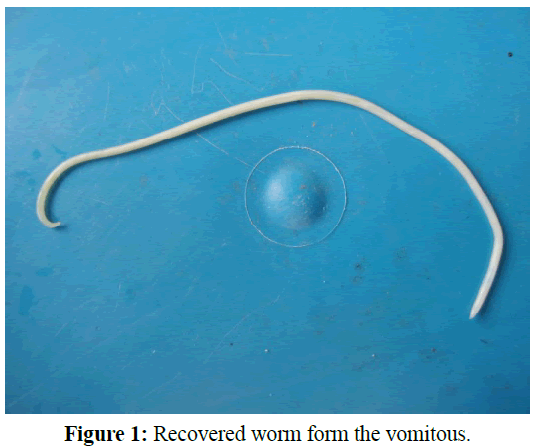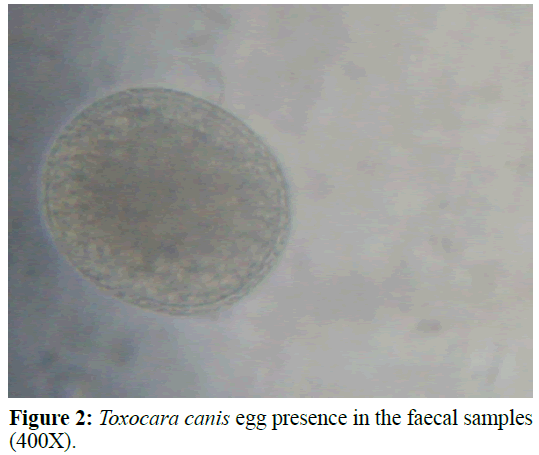Research Article - International Journal of Pure and Applied Zoology (2018) Volume 6, Issue 1
RECURRENT GASTRITIS IN DOGS DUE TO TOXOCARA CANIS INFECTION IN A KENNEL
- *Corresponding Author:
- B Sudhakara Reddy
Department of Veterinary Clinical Complex, Sri Venkateswara Veterinary University, Andhra Pradesh, India
E-mail: bhavanamvet@gmail.com
Received 24th February 2018; Accepted 12th March, 2018; Published 17nd March, 2018
Abstract
Toxocara canis is a worldwide distributed gastrointestinal roundworm of dogs with severe potential zoonotic issues. Present communication reports the recurrent gastritis due to T. canis in a kennel with five dogs. Dogs with history of recurrent vomitions and enteritis were presented to the clinic and examination revealed dullness, rough hair coat, tenesmus and passing foul smell diarrhoea. One white colour warm was noticed in the vomitous and faecal examination revealed presence of Toxocara canis eggs. Based on the history of dogs in a kennel and microscopic examination of the faeces, it was diagnosed as gastritis due to persistence T. canis infection. All the dogs were successfully treated with pyrantel pamoate at 5 mg/kg body weight orally for three consecutive days along with the supportive therapy.
Keywords
Dogs; Toxocara canis; Vomitous; Pyrantel pamoate
Introduction
Toxocara spp. is one of the common gastro intestinal tract parasitic diseases in the animals including ruminants and dogs. Development of the clinical disease depends on the parasitic load including adult worm burden and the immunity of the host (Reddy and Sivajothi, 2017). T. canis is common parasite in the dogs and causes toxocariosis which is one of the major zoonotic diseases transmitted by the infected animals. In dogs, it is transmitted by ingestion of contaminated Toxocara canis eggs, transplacental, transmammary and larval skin penetration (Nijsse et al., 2016). Different reports on the prevalence was reported in India but reports regarding the recurrent gastritis and identification of adult warm in vomitous were rare. Hence, present communication report about the chronic recurrent gastritis due to T. canis infection in a kennel and its successful management.
Materials and Methods
Five dogs (9 months, male, Labrador) with history of chronic, recurrent vomitions and enteritis were presented to the Department of Veterinary Clinical Complex, College of Veterinary Science, Proddatur. Dogs were dull, reduced feed and water intake for the last three days. Similar type of episodes was reported once in a month for the last three months in all the dogs. Upon clinical examination, dogs were dull, depressed, congested conjunctival mucus membrane, rough hair coat, tenesmus and foul smell bloody diarrhoea was noticed. They showed elevated rectal temperature, heart rate and respiratory rate. While abdominal palpation pain at the stomach region was noticed. Faecal samples were collected for the microscopic examination and found presence of T. canis eggs. Further faecal sample were subjected to floatation and sedimentation techniques for further confirmation of parasitic ova. Whole blood, peripheral blood smears and serum were collected for laboratory examination. Blood analysis revealed lowered haemoglobin, increased packed cell volume, reduction in the white blood cell count and reduced albumin levels.
Treatment and Discussion
One the first day of presentation, dogs were treated with injection intravenous 5% dextrose normal saline and ringers lactate at 10 ml/kg body weight, injection ranitidine @ 0.5 mg/kg body weight, injection amoxicillin and cloxacillin @20 mg/kg body weight and injection metronidazole @ 20 mg/kg body weight. While administration of the fluids, one of the dogs started vomitions and one white colour warm was noticed in the contents. The worm was separated from the gastric contents and kept in normal saline solution for further characterization. All the dogs were advised to treat with the same as above in addition with the pyrantel pamoate @ 5 mg/kg body weight orally for three consecutive days. Dogs showed marked recovery during post treatment and re-examination of faecal sample after a week, were found negative for parasitic eggs (Figures 1 and 2).
During the course of infection, adult T. canis worms live in the intestine of dogs and laying eggs that pass into the faeces and contaminate the environment. T. canis eggs are unembryonated and non-infective when excreted in the faeces of dogs. Depending up on the environmental conditions within a period of 3 weeks to several months eggs develop in to the infective larvated stage (Schnieder et al., 2011). Under optimal environmental conditions they can stay viable for the one year and these are very resistant to the adverse environmental conditions. Parental pamoate causes non selective cation channels opening which leads to persistent activation of nicotinic acetylcholine receptors and spastic paralysis of the worms (Overgaauw and Van Knapen, 2013).
In the present study, parasitic ova contaminated the soil and/or floor present in the kennel and it might be reason for development of the chronic and recurrent gastritis in dogs. In view of the zoonotic health issues, education of the owners and family members are essential for control of the disease.
In conclusion present study reports the recurrent chronic gastritis due to T. canis in a kennel. Present study puts the record on the identification of the adult T. canis warms in the vomitous of infected dogs and it might be one of the reasons for contamination of the premises in a kennel.
Acknowledgement
The authors are thankful to the authorities of Sri Venkateswara Veterinary University for providing the facilities to carry out the work.
Conflict of Interest
There is no conflict of interest in between authors.
References
- Nijsse, R., Mughini-Gras L., Wagenaar, J.A., Ploeger H.W., 2016. Recurrent patent infections with Toxocara canis in household dogs older than six months: a prospective study. Parasite Vector. 9: 531.
- Overgaauw P.A., Van Knapen, F., 2013. Veterinary and public health aspects of Toxocara spp. Vet. Parasitol. 193: 398-403.
- Reddy, B.S., Sivajothi, S. 2017. Paralytic ileus due to Toxoxcara vitulorum in a calf and its management. Comp. Clin. Pathol. 26:1335–1338.
- Schnieder, T., Laabs, E.M., Welz, C., 2011. Larval development of Toxocara canis in dogs. Vet. Parasitol. 175: 193-206.

